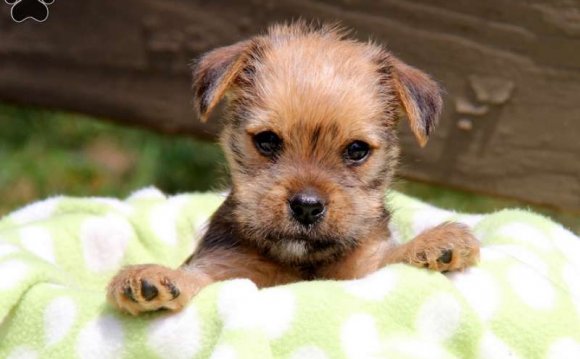
Country of Origin
A mixed breed dog is any dog influenced by multiple breeds, whether its origins are known or unknown. Popular mixed breeds include the Puggle (Pug and Beagle), Ori Pei (Pug and Chinese Shar Pei), and Poodle mixes such as the Labradoodle (includes Labrador Retriever), Goldendoodle (includes Golden Retriever), and Yorki Poo (includes Yorkshire Terrier). Famous mixed breeds include Benji (played by a dog named Higgins), who appeared in the Benji series of films, winning over viewers with his muttish good looks and charming mischievousness, and Tiger from the Brady Bunch.
Size
For the small mixed breed dog, weight can reach upwards of 19 lbs.
Coat
Mixed breed coats come in many shapes, colors, textures, and thicknesses. From the corded Komondor, to the cottony Coton de Tulear, Mexican Hairless, poofy Poodle, and silky Yorkshire Terrier, you ought to be able to find a pure or mixed breed according to any specifications you have in mind!
Character
Mixed breed dogs vary in character from relaxed to hyper, clever to gullible, obedient to stubborn, and loyal to independent. Some mixed breed dogs are friendly with strangers and some are suspicious (they should never be overly aggressive if properly trained). Mixed breed dogs which are suspicious of strangers but dont bark excessively make the best watchdogs.
Temperament
Mixed breed dogs may or may not get along well with dogs and other pets. Mixed breed dogs should be socialized when young with people, other dogs, and any pets with whom they will be expected to live.
Care
Mixed breed dogs have an average lifespan ranging from 7 years for dogs with many congenital health defects, up to 16 or 18 years for healthier breeds (making the dog years calculation a bit of a departure from rock solid science). The worlds oldest dog was an Australian Cattle Dog named Bluey, who was put to sleep at 29 years, 5 months. Larger mixed breed dogs have a shorter average lifespan than small mixed breed dogs. Due to their varied genetic makeup, mixed breed dogs are free from many of the health issues affecting purebredsthis is known as hybrid vigor. The most common health problem for large mixed breed dogs is hip and elbow dysplasia (malformed joints which can cause lameness or arthritis). Generally, a mixed breed will be most susceptible to health problems affecting its parent breeds.
Training
Mixed breed dogs require the same general training techniques as their purebred cousins. Most training should be conducted as early as possible (there is a grain of truth in the old maxim an old dog cant learn new tricks). Most important is obedience trainingthe process of teaching your dog to reliably respond to basic commands such as sit and stay. Any situations your dog will face in later life, such as grooming and bathing, should be introduced as early as possible. It is important to employ a system of consistent rewards and punishment, as well as a wide variety of training methods to hold the dogs interest. Positive reinforcement is generally encouraged over harsh techniques, which backfire in many cases. Some mixed breed dogs will recognize the trainers authority immediately, while others require a fair amount of effort. Housebreaking techniques will vary by breed.



